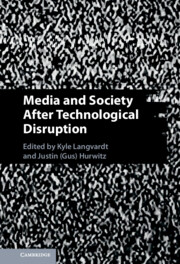The internet has remade both the media and the social institutions that surround the media. Speech was not cheap in the twentieth century. News organizations had to buy newsprint, paper, distribution networks, transmitters, spectrum licenses – all kinds of things that cost much more than a Facebook page – if they wished to reach an audience. But the few news organizations that could cover these costs held a safe market position, and from this perch, they wielded a great deal of epistemic and moral authority in their communities. They became “gatekeepers” with the power and the responsibility to decide what information, and what claims, were fit to print. Much of media law, and particularly First Amendment law, seems to have developed around the assumption that news organizations could and would play this gatekeeping role, and that the government should therefore rarely need to.
That world is gone. Competition from the internet and social media has decimated the business model that underwrote the twentieth century’s gatekeepers. And those twentieth-century media institutions that have survived disruption – institutions such as the New York Times or the major television networks – are in no position to play gatekeeper. News consumers mostly get whatever flavor of “news” they wish, and individual speakers mostly decide what kind of speech is fit to post. There are gatekeepers in this environment, but they are institutions like Facebook, TikTok, or YouTube that bear little resemblance to yesterday’s news giants and that wield their power in ways that lack any clear twentieth-century analog. The law is only beginning to catch up.
This project gathers sixteen scholars in law, media, technology, and history to consider these changes together. We divided these sixteen scholars into four groups of four, with each group considering one broad facet of the situation.
Part I: Trusted Communicators
We asked the first group of authors to write on the decline in trust that traditional media institutions have suffered in recent years. Authors reflected on the implications of this decline in trust for media’s ability to shape and convene public discourse. They also considered the causes of this loss in trust, and what might be done to get it back.
Part II: Defamation and Privacy
The second group of authors wrote on the law’s role in policing communications that inflict privacy and reputational harms. This group paid particular attention to the role of technological development in driving a proliferation of harmful speech, and also to the law’s emergent response.
Part III: Platform Governance
We assigned the third group to write on tech platforms and the role they play as private regulators of the content they host. Authors wrote on how this regulation plays out in practice, and more generally, on its costs, benefits, and risks. The group also considered changes to regulatory or technical architecture that may improve the systems of content moderation that is in place today.
Part IV: Sustaining Journalistic Institutions
This final group wrote on traditional media institutions’ struggle to maintain financial solvency in the twenty-first century. Authors compared the failure of some models (newspapers) with the successes of others (television, social media), and considered various regulatory proposals to stanch the losses.

